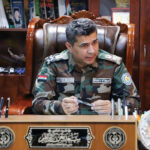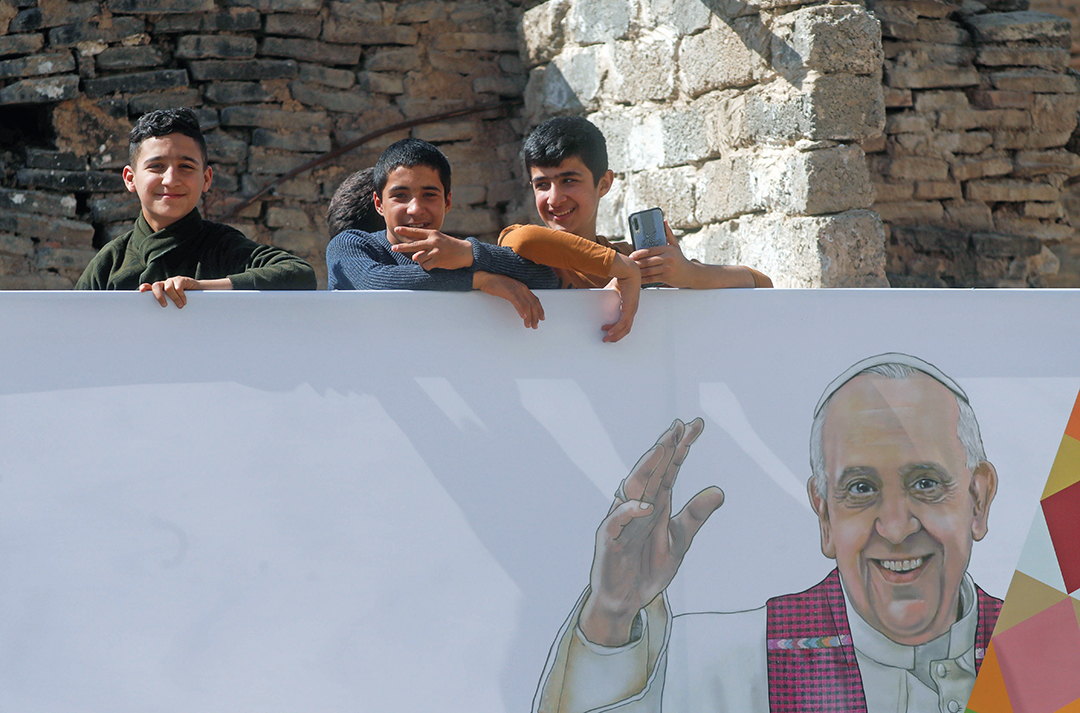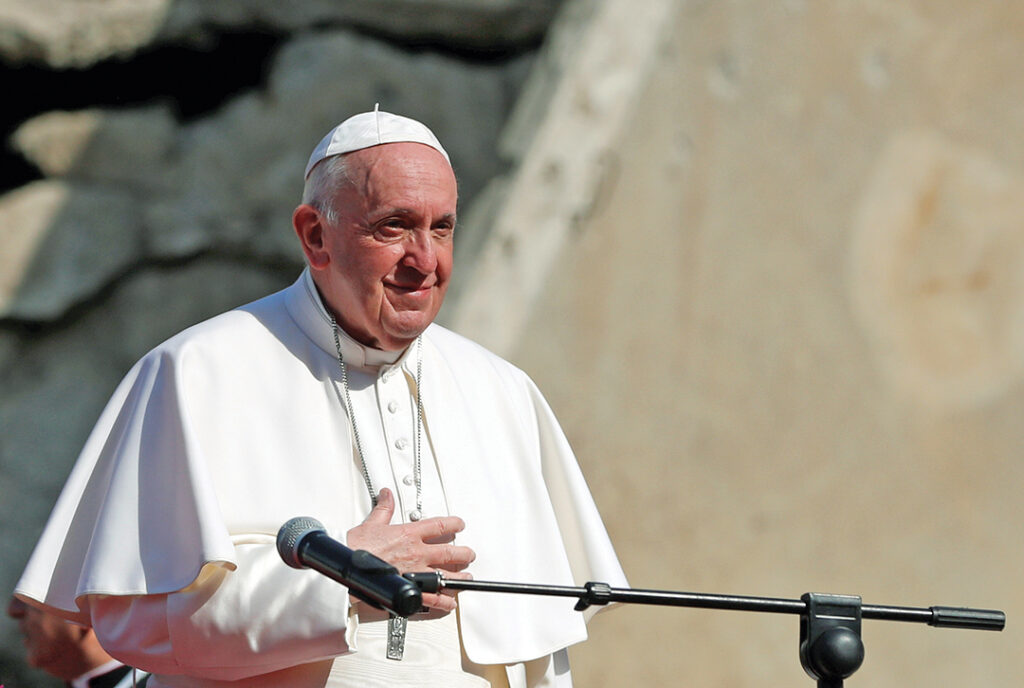
The arrival of Pope Francis to Iraq in March 2021 provided a common rallying point for Iraqis of all sects and ethnicities. Unipath talked to Maj. Gen. Saad Maan, director of the Iraqi media and security cell, about the importance of Iraqi security for the pope’s visit.
Unipath: How important was the pope’s historic visit to Iraq?
Maj. Gen. Saad Maan: His Holiness Pope Francis’ visit to Iraq was met with a remarkable welcome and joy not only from Christian citizens of Iraq but also from every religious sect and ethnic group in the country. His visit was a monumental event because it was the first overseas trip by the pope since the COVID-19 pandemic. It was also the first visit by a pope to the city of Ur in southern Iraq. Ur is a holy city of great importance to human civilization. Built by our Sumerian ancestors as their capital in the 26th century B.C., it was the cornerstone of Mesopotamia, the cradle of civilization, and the birthplace of the father of the prophets, Abraham. His Holiness’ visit to Iraq was therefore a confirmation to the world that this blessed land is the source of all monotheistic religions and a land of peaceful coexistence. The visit had a tremendously positive political, economic and social impact.
Unipath: What does it mean for Iraqis to have the pope visit and hold services at Our Lady of Salvation Church, site of a vicious terrorist attack?
Maj. Gen. Saad Maan: Holding Mass at Our Lady of Salvation Church in central Baghdad gave a true picture of the reality of Iraq, the triumph of truth over falsehood and of peace over terrorism. It is also a message to terrorist gangs that Iraqis have witnessed peaceful coexistence for thousands of years and cannot be defeated in the face of deceptive ideology. We all remember the 2010 attack on Our Lady of Salvation Church, which was intended to ignite a war between Muslims and Christians in Iraq and Egypt that would spread across the entire region, wherein the terrorists, speaking the Egyptian dialect, demanded the release of an Egyptian woman from the Coptic Church in a phone call to a satellite TV station. It was, of course, a story fabricated by terrorists to fuel sectarian strife. Five suicide bombers from the Islamic State of Iraq stormed the church during Mass with the intention of killing the worshippers and posting the bloody scenes on social media as Iraq prepared to host the Arab summit. But the courage of the security forces thwarted the terrorists’ plans, and they were able to free most of the hostages after about 50 citizens had been martyred in the brutal attack.
The pope’s visit assured the world that Iraq is safe and that Our Lady of Salvation has overcome terrorism and remains open to worshippers. The work of the security forces and everyday citizens to ensure the success of Mass in the church where the souls of the righteous martyrs were hovering in celebration of His Holiness the Pope’s presence was remarkable. Many Muslims [also] attended the service to express support for their Christian brothers and to welcome Iraq’s great guest and friend of peace. This historic church has great symbolism for Iraqis, and people of all denominations come to light candles and enjoy the tranquility and sanctity of the place.

Unipath: How was the pope’s visit to Mosul received, considering Daesh once declared the city its capital?
Maj. Gen. Saad Maan: The world welcomed this visit with great satisfaction and hope for a promising future for Iraq and the region. In the Hosh al-Bayaa district, which suffered extensive destruction at the hands of Daesh, the people of Mosul welcomed the pope with prayers and joyous ululation. Iraq has long been at the forefront of international and Arab news broadcasts reporting on bloody events and bombings, but for the first time in years, Iraq is making an appearance for joyous reasons, free from war, fighting and terrorism. For the first time, the world was united in reporting good news about Iraq. The news was a matter of pride for all Iraqis at home and abroad, especially since the dear city of Mosul experienced a dark and bloody period for two years under the influence of some of the most extreme terrorist gangs, who demolished monuments, burned houses and expelled minorities. Daesh destroyed 14 churches in this city, seven of which date back to the fifth, sixth and seventh centuries.
Before suffering a reign of terror from Daesh, Mosul had been “the mother of two springs” and the land of peaceful coexistence, where the morning began with the ringing of church bells and the Muslim call to prayer. When Daesh invaded Mosul, that beautiful dream was shattered. They killed children and violated the sanctity of our Yazidi brethren, taking Yazidi women captive. Terrorist gangs broke into homes as if they were Nazis, scrawling the Arabic letter “n” [the first letter of the word Nasara, a term for Christians] on the walls of the homes of non-Muslims, sowing terror in the hearts of the population and causing people to leave their belongings behind and flee Mosul. Muslims couldn’t bear to live in the midst of the terror afflicting their brothers and neighbors, and decided to flee as well. Terrorism transformed this beautiful city into a mass of ruins, tunnels and demolished buildings. Not even the Great Mosque of Al-Nuri, famous for its leaning minaret, escaped their terror. These events made His Holiness the Pope’s visit that much more important, as a way to reassure those Mosulites still living far from home and to send a message to the world that terrorism was defeated in the mother of two springs. The whole world witnessed the Mass in central Mosul amidst the ruins of a church destroyed by Daesh. In my opinion, what made His Holiness’ visit to Mosul so remarkable were his historic words calling on Christians to return to the city. Addressing the world, he said, “We affirm our conviction that fraternity is stronger than the voice of hatred and violence” and that “religious affiliations must be transcended in order to live in peace and harmony. It is unfortunate that the country of civilizations was subjected to this terrorist attack.”
Unipath: Which Iraqi security services provided security for the pope’s visit?
Maj. Gen. Saad Maan: Joint Operations Command (JOC) planned the protection for the visit and assigned roles to various security agencies. JOC has an advanced operations room that communicates with all the security agencies and coordinates with the rest of the ministries, and is personally supervised by the prime minister. Of course, the Ministry of the Interior had the largest role as its duties started as soon as the pope arrived at the airport, providing security for the convoy in Baghdad and the governorates. But this historic visit involved all security and civilian institutions. The plan was very successful, and I would like to express sincere thanks to all security leaders for their role in making this historic visit a success. Everyone worked diligently and as a team because the pope’s visit was a point of real pride for the whole of Iraq, and the success of the visit without any security breaches showed that Iraqi security services are capable of providing protection and security in the country.
Unipath: Ayatollah Ali al-Sistani lives in the old part of the city of Najaf known as Amara, where the alleys are very narrow for vehicles. How did you secure the surrounding area?
Maj. Gen. Saad Maan: Najaf governorate is, of course, one of the safest cities in the world, so we didn’t have any problem securing His Holiness the Pope’s visit to Grand Ayatollah Ali al-Sistani. However, the security services put together a detailed plan to secure the visit, particularly down the old narrow alleyways through which His Holiness the Pope walked on his way to His Eminence Sayyed Sistani’s home. From his expression, the pope clearly felt comfortable walking in those alleys, which are a sign of His Eminence Sayyed Sistani’s modesty and asceticism. We followed the security situation in the city every step of the way. There was aerial reconnaissance and centralized control from the JOC operations room of all roads and buildings leading to His Eminence’s house.
Unipath: By your reckoning, were there any security threats targeting the pope by Daesh that you planned to thwart?
Maj. Gen. Saad Maan: Obviously, when a figure as important as His Holiness the Pope visits remote areas far from government headquarters, he will be an easier target for terrorist gangs trying to undermine security. We know that terrorists seek to paint a distorted image of Iraq and take every opportunity to commit a terrorist offence — whatever the cost — to embarrass the government and convince the world that Iraq is an unstable country. Because of this, precise calculations had to be made for every potentiality as part of the security plan. We in Iraq have accumulated field experience combating terrorism. Security leaders paid great attention to detail to secure roads and buildings, mobilizing intelligence efforts and employing modern monitoring and surveillance techniques to assemble a plan comprising numerous cordons and stages. Thankfully the plan was a success.
Unipath: What security challenges did security forces face during the visit?
Maj. Gen. Saad Maan: His Holiness the Pope’s visit to the Old City of Mosul presented a big challenge because of the presence of sleeper cells and the poor state of the roads as a result of the considerable destruction that befell the city. The place that was chosen for the Mass is open with several buildings overlooking it. That, combined with the lack of alternative access roads, made securing the area complex. The pope’s visit to Our Lady of Salvation Church in the middle of the crowded capital was also challenging, as was his visit to the city of Ur in Dhi Qar governorate, which was experiencing unrest as a result of demonstrations and the presence of a temporary local government that took over weeks before the pope’s visit. That made developing a security plan almost impossible. However, thanks to the professionalism of our security forces, outstanding intelligence efforts, teamwork of the joint forces and cooperation of citizens and their support for the security forces, we overcame all the security challenges and were successful in securing this historic visit.
Unipath: How long did you take to prepare and complete the security plan?
Maj. Gen. Saad Maan: Despite the security challenges in Iraq and the continuation of military operations in pursuit of the remnants of terrorist groups in the Mosul desert and the Hamrin Mountains, we were able to complete preparations within a matter of weeks in advance of the visit. We also conducted field exercises and reconnaissance of the areas that the pope would visit. Thankfully, things went smoothly and the security services were in complete control. I think that the cumulative experience of security and military commanders and the lessons learned from military and security operations in years past have refined the experience of our security forces, enabling us to carry out multiple missions simultaneously, raising the morale of our members and enhancing trust between leadership and the ranks.
Unipath: How would you rate the interoperability of the various Iraqi security agencies in providing security for the pope’s visit?
Maj. Gen. Saad Maan: The security plan demonstrated the cohesiveness, synergy and teamwork of the security services in securing this important historic visit. Our security forces enjoy great flexibility in working with other state agencies, particularly as a result of the experience of the joint operational environment since 2014. Working with international coalition forces during the liberation battles also provided our security forces with considerable experience. I am proud to say that the synergy and cooperation during the process of securing the pope’s visit was of the highest level, which earned us the respect and confidence of the Iraqi people and the world, which witnessed the outstanding performance of the Iraqi security forces.

